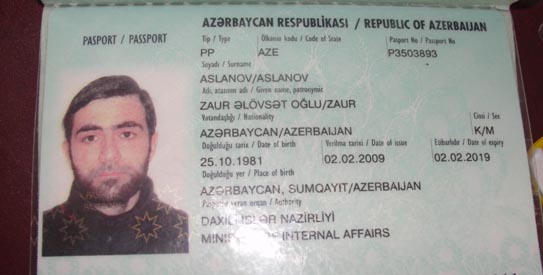
Pakistani officials identified an al Qaeda operative from Azerbaijan as one of the six "foreigners" killed during recent clashes in the Kurram tribal agency that have resulted in the deaths of 23 Pakistani troops and 60 terrorists. The Azeri national traveled through Iran to reach Pakistan on a visa issued by the Iranian consulate in Baku.
The Azeri national was identified as Aslanov Zaur, according to his passport and other documents that were obtained by Dawn. Pakistani officials also seized travel documents, "card readers and other devices" which contained photographs of other terrorists, and Sudanese and American currencies.
Zaur was described by Dawn as "a key commander" who "played an instrumental role in attacks on Pakistani security forces in the tribal areas."
Zaur was killed during a series of Pakistani airstrikes in the Jogi area of Kurram on Feb. 1. Five other "foreigners," a term used to describe members of al Qaeda and allied terror groups, and 14 Taliban fighters were said to be killed in the airstrike. Among those thought to have been killed in the strike was a Taliban commander known as Moheyuddin.
The Pakistani military has been battling the Taliban in Kurram since the end January, and has paid a heavy price. Twenty-three troops have been killed in the intense clashes. On Jan. 25, six Pakistani soldiers were killed in a Taliban ambush in Jogi; 17 Taliban were also killed in the fighting. On Jan. 31, 10 Pakistani soldiers and 25 Taliban fighters were killed during fighting in Jogi. And on Feb. 3, seven Pakistani soldiers and 18 Taliban fighters were killed after the Taliban attacked a military outpost in Shidano Dand. The Taliban said it captured four Pakistani troops during the fighting on Feb. 3.
Kurram is a stronghold of the Movement of the Taliban in Pakistan as well as the Haqqani Network. Both groups have strong links to al Qaeda, and are known to shelter al Qaeda leaders and fighters.
Zaur utilized al Qaeda's ratlines in Iran to join the jihad
According to the documents in Zaur's possession, he "was issued an Iranian visa by the Iranian embassy in Bakku for three months from March 2, 2009 to May 31, 2009," Dawn reported. He traveled to the Iranian city of Astar on March 26, 2009, "and since than had gone underground."
"He is suspected to have entered Afghanistan and then Pakistan through unfrequented routes," Dawn continued.
Zaur likely utilized a well-worn path used by jihadists to enter Afghanistan and Pakistan.
In July 2011, the US government accused Iran of having a "secret deal" with al Qaeda that allows terrorists to use the country as a transit point.
"Iran is the leading state sponsor of terrorism in the world today. By exposing Iran's secret deal with al Qaeda allowing it to funnel funds and operatives through its territory, we are illuminating yet another aspect of Iran's unmatched support for terrorism," Under Secretary for Terrorism and Financial Intelligence David S. Cohen said in a State Department press release announcing the designation of Ezedin Abdel Aziz Khalil and five other al Qaeda operatives. Khali was described as "a prominent Iran-based al Qaeda facilitator." State described Iran as "a critical transit point for funding to support al Qaeda's activities in Afghanistan and Pakistan." [See LWJ report, Treasury targets Iran's 'secret deal' with al Qaeda.]
Iran is known to support al Qaeda and Taliban operations in Afghanistan. The Qods Force, the special operations branch of Iran's Islamic Revolutionary Guards Corps, has tasked the Ansar Corps, a subcommand, with aiding the Taliban and other terror groups in Afghanistan. Based in Mashad in northeastern Iran, the Ansar Corps operates much like the Ramazan Corps, which supports and directs Shia terror groups in Iraq. [See LWJ report, Iran's Ramazan Corps and the ratlines into Iraq.] Al Qaeda additionally uses the eastern cities of Tayyebat and Zahedan to move its operatives into Afghanistan. [See LWJ report, Return to Jihad.]
The US government has sanctioned the Ansar Corps commander for aiding the Taliban. On Aug. 6, 2010, General Hossein Musavi, the commander of the Ansar Corps, was one of two Qods Force commanders added to the US Treasury's list of specially designated global terrorists, for directly providing support to the Taliban in neighboring Afghanistan.
Wanted jihadists such as Mevlut Kar, an Islamic Jihad Union operative, are known to have aided terrorists with entering Afghanistan from Iran.
Iran is also known to have placed scores of al Qaeda leaders, operatives, and their families, into protective custody after many fled Afghanistan during the US invasion and the ouster of the Taliban in 2001-2002. While in Iranian custody, however, top al Qaeda leaders and operatives, including Saif al Adel, who is now al Qaeda's acting leader after Osama bin Laden's death, and Saad bin Laden, are known to have planned and executed attacks in the region.
And in recent years, Saif al Adel, Saad bin Laden, Hamza bin Laden, Sulaiman Abu Ghaith, Mafouz Ould Walid (Abu Hafs al Mauritanian), and dozens of other al Qaeda leaders, operatives, and family members have been released from Iranian custody. [For more information on Iran's detention of al Qaeda leaders, see LWJ reports, Osama bin Laden's spokesman freed by Iran, and Analysis: Al Qaeda's interim emir and Iran.]